条件状语从句、反义疑问句
第07练 反义疑问句(解析版)2023年【暑假分层作业】高一英语(人教版2019)

第07练反义疑问句反义疑问句即附加疑问句。
它表示提问人的看法,没有把握,需要对方证实。
它表示提问人的看法,没有把握,需要对方证实。
反义疑问句由两部分组成:前一部分是一个陈述句,后一部分是一个简短的疑问句,两部分的人称时态应保持一致。
1、陈述部分肯定式+疑问部分否定式2、陈述部分否定式+疑问部分肯定式They work hare,don’t they?She was ill yesterday,wasn’t she?You didn’t go,did you?He can’t ride a bike,can he?请注意以下句型的反义疑问句的用法:1、当陈述部分的主语是I,everyone,everything,nobody时,后面的疑问句应表示为:I am a student, aren’t IEveryone is in the classroom,aren’t they?Everything begins to grow in spring,doesn’t it?Nobody will go,will they?2.当陈述部分有never,seldom,hardly,few,little,barely,scarcely,nothing等否定词时,后面的疑问句则表示为:There are few apples in the basket,are there?He can hardly swim,can he?They seldom come late,do they?3.当陈述部分是I think加从句时,疑问句应和从句的人称时态保持一致。
I think chickens can swim, can’t they?I think Lucy is a good girl,isn’t she?I didn't think he was happy,was he?4.陈述部分有had better时,疑问句应用hadn’t开头:you’d better get up early,hadn’t you?5.当陈述部分是祈使句时,疑问句要根据语气来表达Let’s go out for a walk,shall we?Let us go our for a walk,will you?Turn on the radio,will you?6.反义疑问句的回答用yes,no,但是,当陈述部分是否定形式时,回答要按事实。
条件状语从句、反义疑问句
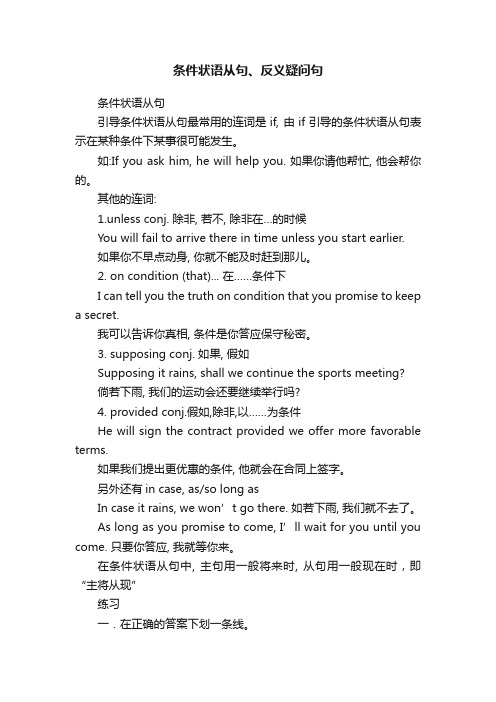
条件状语从句、反义疑问句条件状语从句引导条件状语从句最常用的连词是if, 由if引导的条件状语从句表示在某种条件下某事很可能发生。
如:If you ask him, he will help you. 如果你请他帮忙, 他会帮你的。
其他的连词:1.unless conj. 除非, 若不, 除非在…的时候You will fail to arrive there in time unless you start earlier.如果你不早点动身, 你就不能及时赶到那儿。
2. on condition (that)... 在……条件下I can tell you the truth on condition that you promise to keepa secret.我可以告诉你真相, 条件是你答应保守秘密。
3. supposing conj. 如果, 假如Supposing it rains, shall we continue the sports meeting?倘若下雨, 我们的运动会还要继续举行吗?4. provided conj.假如,除非,以……为条件He will sign the contract provided we offer more favorable terms.如果我们提出更优惠的条件, 他就会在合同上签字。
另外还有in case, as/so long asIn case it rains, we won’t go there. 如若下雨, 我们就不去了。
As long as you promise to come, I’ll wait for you until you come. 只要你答应, 我就等你来。
在条件状语从句中, 主句用一般将来时, 从句用一般现在时,即“主将从现”练习一.在正确的答案下划一条线。
1.Daina ( will go/go/goes) to Europe if she (will pass/pass/passes) the exams .2. The graduates (will teach/teach/teaches) in the poor village if the Ministry of Education (will agree/ agree/agrees) soon.3. If there (will be/ are/is) a car accident, they (will call/call/calls) 110 for help at once.4. If it (won’t/don’t/doesn’t/ isn’t) rainy, we (will take/ take/takes) walk outside.5. If a UFO (will land/land/lands) in front of me, I (will go/go/goes) in to look for the alien.二、用所给词的适当形式填空1.If you ________(feel) tired, you _______________ (have) to havea rest.2. Where _______ he _________(see) the film if he ________________(have) time?3. If there __________(be) fewer trees, there _______________( be) more pollution.4. He _____________(dress) more casually if he ________________( not work) on weekends.5. If Marcia _____________(live) alone, she ___________________( keep) a pet parrot.三、翻译句子15.如果他到的晚了会发生什么事情?What _______________ if he _____________ late?16. 如果努力学习,你就会取得好成绩。
反义疑问句

反意疑问句。
1、什么是反意疑问句英语中,反意疑问句是由陈述句和附在其后的附加疑问句组成。
反意疑问句有四种类型:(1)肯定陈述+否定简短问句;(2)否定陈述+肯定简短问句;(3)肯定陈述+肯定简短问句;(4)否定陈述+否定简短问句。
其中,前两种运用最为广泛。
除此之外,反意疑问句还有“祈使句+简短问句”的形式,这种用法通常用于减弱祈使语气。
如: Carry this parcel for me, can you? 给我拿一下包,好吗?陈述部分含“too...to”时,是否定句2.反意疑问句的结构:陈述句(主语+谓语……),+助动词/情态动词/be动词+主语(代词形式);陈述句部分如果是肯定句,反意疑问句,疑问句部分的助动词/情态动词/be动词+n ot (否定提问);如果陈述句部分是否定句,反意疑问句,疑问句部分用肯定式提问。
用法说明1.陈述句中是I am时,简短问句则用aren’t I。
I am an excellent English speaker, aren’t I?I am late, aren’t I ?I'm as tall as your sister,aren't I?(我和你姐姐一样高,对吗?)2. 陈述部分的主语是I , 附加疑问句的部分的主语用you,以表示征询对方的意见,这时等于另外的一个句子,相当于how/what about you ?what do you think ?I like living in the country, don’t you?= I like living in the country, how about you?I found English interesting, don‘t you?= I found English interesting, what do think?3.陈述句中是非限定人称代词one时,正式文体中,简短问句的主语为one,而非正式文体中用you。
条件状语从句的四种类型解析

条件状语从句的四种类型解析条件状语从句是英语语法中常见的一种从句类型,用于表示一个条件或假设。
它可以通过四种不同的方式来表达,在文章中起着重要的作用。
本文将对这四种类型进行详细解析。
第一种类型:真实条件状语从句真实条件状语从句用来表示一个可能发生的条件和其结果。
它的结构是“if + 陈述句,陈述句”。
该类型的状语从句使用的是一种常见、普遍的条件句结构。
例如:If it rains, we will stay at home.(如果下雨,我们会呆在家里。
)If I have time, I will go to the library.(如果我有时间,我会去图书馆。
)这种类型的状语从句所表达的条件通常是可能实现的,所以它与现实情况相符。
第二种类型:虚拟条件状语从句虚拟条件状语从句用来表示一个假设性的条件和其结果。
它的结构是“if + 过去式,would/could/might + 动词原形”。
该类型的状语从句常用于表达不太可能实现的条件。
例如:If I were rich, I would travel around the world.(如果我富有,我会周游世界。
)If he had studied harder, he could have passed the exam.(如果他努力学习,他本可以通过考试。
)在这种类型的状语从句中,主句通常包含一个虚拟语气的动词,表示对现实情况的一种想象或假设。
第三种类型:反过来的条件状语从句反过来的条件状语从句用来表示一个反向的条件和其结果。
它的结构是“had/should + 陈述句,would/could/might + 动词原形”。
该类型的状语从句常用于反向的条件假设。
例如:Had it not been for your help, I would have failed.(如果不是你的帮助,我就会失败。
)Should you need any assistance, feel free to contact me.(如果你需要任何帮助,随时联系我。
从句的分类
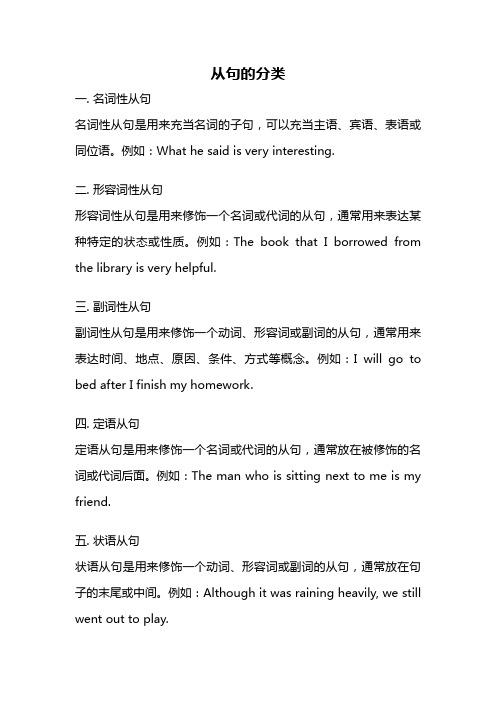
从句的分类一. 名词性从句名词性从句是用来充当名词的子句,可以充当主语、宾语、表语或同位语。
例如:What he said is very interesting.二. 形容词性从句形容词性从句是用来修饰一个名词或代词的从句,通常用来表达某种特定的状态或性质。
例如:The book that I borrowed from the library is very helpful.三. 副词性从句副词性从句是用来修饰一个动词、形容词或副词的从句,通常用来表达时间、地点、原因、条件、方式等概念。
例如:I will go to bed after I finish my homework.四. 定语从句定语从句是用来修饰一个名词或代词的从句,通常放在被修饰的名词或代词后面。
例如:The man who is sitting next to me is my friend.五. 状语从句状语从句是用来修饰一个动词、形容词或副词的从句,通常放在句子的末尾或中间。
例如:Although it was raining heavily, we still went out to play.六. 同位语从句同位语从句是用来解释或说明某个名词或代词的从句,通常放在被解释或说明的名词或代词后面,用逗号或冒号隔开。
例如:My dream, that I can travel around the world, is very beautiful.七. 反义疑问句反义疑问句是由一个陈述句和一个反问句组成的句子,用来表示询问者对所说的话是否正确或期望得到回答。
例如:You can speak English, can't you?八. 倒装句倒装句是将主语和谓语的位置颠倒过来的句子,通常用来表示强调或判断。
例如:Never have I seen such a beautiful sunset.九. 感叹句感叹句是用来表达强烈情感或感叹的句子,通常用来表示惊讶、喜悦、悲伤等情感。
总结好的:if引导的条件状语从句

if引导的条件状语从句if1) 用法:(1)条件状语从句通常由连词if引导,意为“如果、假如”,主句不能用be going to表示将来,而应该用shall,will。
If you leave now, you are never going to regret it. (错误)If you leave now, you will never regret it. (正确)(2)if “如果”,引导条件状语从句,主句用一般将来时,从句则用一般现在时,如:If it rains tomorrow, I shan’t climb the hills.(3)另外,主句是祈使句或含有情态动词,从句也用一般现在时。
如:Please call me if he comes next Sunday.Can you call the policeman if you are in the trouble.注意宾语从句中的if与条件状语从句if的区别。
宾语从句中的if“是否”相当于whether,引导宾语从句,时态需根据语境确定。
如果主句用一般现在时,从句可以根据具体情况选用时态,如果主句用一般过去时,从句必须用过去式的某种形式。
I don't know if it will rain tomorrow. 我不知道明天是否会下雨。
Our teacher said there was going to be a football match the next month.我们说下月将有场足球比赛。
【边学边做】用括号内所给词的正确形式填空。
1. What will you buy if you ________(have)a lot of money?2. If it ________(not snow)tomorrow, we will feel unhappy.3. You mustn’t go to school if you ________(be)still in bed.4. If he _______(be)at home at that time, he would know it.5. Please show me the way if you ________(know)it.6. You will hurt your teeth if you ________(eat)too much candy.7. If you gave me a toy car, I _________(be)very happy.8. I would get the prize if I _________(work)hard.9.If she ______ (finish ) work early ,she ______(go) home.10.If the weather______(be)fine,we_______(go)for a walk .11. If I_____(have) time tonight ,I _______(finish) the book I’m reading.12. If it ______(rain) next weekend , we_______(not be able to ) plant the vegetable .13. If it_______(rain),we______(stay) at home .14.If she______(arrive) ,she _____(phone) me .15. If he_____(call),tell him I’ll ring back .二、用所给词的适当形式填空1. If you ________(feel) tired, you _________ (have) to have a rest.2. Where _____ he ____(see) the film if he _________(have) time?3. If there ____ (be) fewer trees, there _______ (be) more pollution.4. He ___ (dress) more casually if he ___ (not work) on weekends.5. If Marcia _______ (live) alone, she _______ (keep) a pet parrot.6. Lana _____ (buy) a new dress if the old one ____ (be) out of style.7. The twins _______ (fight) if they__________ (argue).8. I ______ (have) a bake sale if I ____ (need) money for education.9. Peter ____ (send) me a beautiful souvenir if he ____(tour) Spain.10. If Mr. Green _______ (say) I am hard- working, my parents ___ (feel) glad.11. I ______ (go) to the beach if it________ (not rain) this week.12. _____they ___ (have) a match if the P.E. teacher __ (be) busy?13. He ____ (write) a letter to his grandparents if he ____ (get) his report card this week.14. If she ______ (get) up late, she _____ (not catch) the early bus.15. Peter ____ (major) in English if he ____(pass) the exams in Peking University.二、完成句子1. 他如果看电视太久了,他的父母会不高兴。
词汇与语法 第7讲(从句-反义疑问句)

从句归纳
►
► 1.
2.
3.
从句是指从属于主句的句子,由从属连词引 导,充当句子的某个成分,如主语,宾语, 表语,同位语,定语,状语等。 根据在句子中的不同作用,从句可分为: 名词性从句(包括主语从句,宾语从句,表 语从句和同位语从句) 形容词性从句(即定语从句) 副词性从句(即状语从句)
真题回顾
► Many
of the people refused to answer any questions. (学位真题2008年6月) ► A. question B. questioned ► C. questioning D. were questioned ► 答案:B ► 解析:考察过去分词做定语。
The order when we should return hasn’t reached us. 我们什么时候该返回的命令还未到 。 (order与从句没有逻辑关系) The day when New China was founded will never be forgotten. 新中国成立的那天永远不会被忘记。 (the day在从句中作状语)
真题回顾 ____life could be found on Mars was once believed by scientists. (学位真题2008年6月) ► A. What B. As ► C. That D. While ► 答案:C ► 解析:考察主语从句的理解。
► ► Contact
It is still a question when we shall have our sports meet.
常见的用it作形式主语的复合句结构: 1)It is + 名词+ that 从句 It is a fact (a shame, a pity, no wonder, good news, …) that … 2)It is + 形容词+ that 从句 It is necessary (strange, important, wonderful, possible, likely, …) that (虚拟) 3) It is+过去分词+that 从句 It is said (reported, decided, …) +that 从句
条件状语从句的引导词及句型转换

条件状语从句的引导词及句型转换条件状语从句是英语中常用的一种从句结构,用来表示条件、原因、目的等。
在条件状语从句中,引导词起着引导句子结构的作用,而句型转换则可以使表达更加灵活多样。
本文将介绍条件状语从句的常见引导词及句型转换方法。
一、条件状语从句的引导词常见的条件状语从句引导词有:if, whether, unless, provided (that), as long as等。
1. IfIf是条件状语从句的最常见引导词,表示“如果”,可用来引导真实条件状语从句与虚拟条件状语从句。
例如:- If it rains tomorrow, we will stay at home.- If I were you, I would take the job.2. WhetherWhether是用来引导陈述句的间接疑问句,表示“是否”。
例如:- I don't know whether he will come to the party or not.3. UnlessUnless表示“除非”,相当于if...not,引导否定条件状语从句。
例如:- You will fail the exam unless you study hard.4. Provided (that)Provided (that)表示“只要”,相当于as long as。
例如:- You can go out to play provided (that) you finish your homework.二、条件状语从句的句型转换条件状语从句可以通过句型转换来增加语言表达的多样性。
1. 将条件状语从句改为条件状语从句的省略句当主句与条件从句的主语和谓语相同时,可以将从句中的主语和be 动词省略。
例如:- If you come late, you will miss the train.变为:Come late, you will miss the train.2. 将条件状语从句改为条件状语从句的倒装句当主句与条件从句中的某些状语或状语修饰语倒装时,可以将条件从句改为倒装句。
九年级英语复习 虚拟语气 反义疑问句
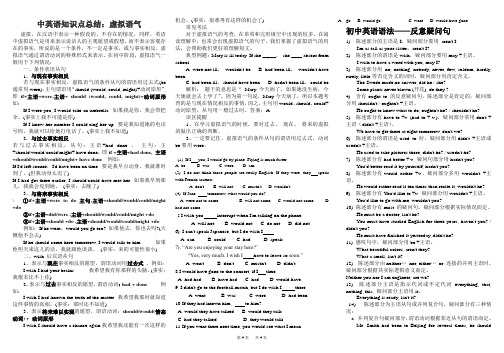
中英语知识点总结:虚拟语气虚拟,在汉语中表示一种假设的,不存在的情况,同样,英语中虚拟语气是用来表示说话人的主观愿望或假想,而不表示客观存在的事实,所说的是一个条件,不一定是事实,或与事实相反。
虚拟语气通过谓语动词的特殊形式来表示。
在初中阶段,虚拟语气一般用于下列情况:一、条件状语从句1、与现在事实相反若与现在事实相反,虚拟语气的条件从句的谓语用过去式(be 通常用were),主句谓语用“should (would, could, might)+动词原形”,即if+主语+were,主语+ should (would, could, might)+动词原形如:If I were you, I would take an umbrella. 如果我是你,我会带把伞。
(事实上我不可能是你)If I knew her number I could ring her up. 要是我知道她的电话号码,我就可以给她打电话了。
(事实上我不知道)2、与过去事实相反若与过去事实相反,从句:主语+had done ,主句:主+should/would/could/might+ have done,即if +主语+had done, 主语+should/would/could/might+ have done例如:If I'd left sooner,I'd have been on time. 要是我早点动身,我就准时到了。
(但我动身太迟了)If I had got there earlier, I should/could have met her. 如果我早到那儿,我就会见到她。
(事实:去晚了)3、与将来事实相反\ ①if+主语+were to do 主句,主语+should/would/could/might +do②if+主语+did/were ,主语+should/would/could/might +do③if+主语+should +do ,主语+should/would/could/might +do例如:If he went,would you go too? 如果他去,你也去吗?(大概他不会去)If he should come here tomorrow, I would talk to him. 如果他明天来这儿的话,我就跟他谈谈。
初中英语知识点总结:宾语从句和状语从句

一、宾语从句知识点总结 在句子中起宾语作用的从句叫做宾语从句。
学习宾语从句要抓住三要素:引导词、语序和时态。
一、引导词 1.从句为陈述句,常选择引导词that,that引导宾语从句无意义,不充当句子成分常省略。
例句:He told us (that)they would help us through the whole work. 2.从句为一般疑问句,常选择引导词if或whether,表示“是否”。
在whether … or not 结构中不能用 if 替换。
例句:I don't know if there will be a bus any more. 3. 从句为特殊疑问句,常选择what,when,where,which,who,how等的疑问代词、副词作引导词。
例句:He didn't tell me when we should meet again. 二、判断时态情况: 1.主句是一般现在时,从句可以为各种时态。
2.主句是一般过去时,从句要用相应过去时态。
注意:从句描绘客观事实、真理、自然现象等,从句时态不受主句时态限制,仍用一般现在时。
例句:He answered that he was listening to me. Father told me that practice makes perfect . 三、宾语从句的语序要用陈述句语序 陈述句语序,就是主语在前,谓语动词在后。
错误:He is wondering when can he finish this difficult job. 正确:He is wondering when he can finish this difficult job. 注意:宾语从句的否定转移 主句的谓语动词是think,believe,imagine,suppose,consider,expect,fancy,guess等,并且主句的主语是第一人称而且为一般现在时,从句的否定词一般要转移到主句上来,其反义疑问句一般与宾语从句一致。
英语中的句法

• • • • • •
•
This is the best film that I have ever seen. The first man arrived at the class was our headteacher. This is the only ticket that I got yesterday. This is the very book that I’m looking for. Is there anything that I can do for you? All that you have to do is to press the button. There is no time that we can waste. The car and its driver that knocked down the old lady have been taken to the police station. Who is the man that is standing under the tree?
复合句
名词性从句
定语从句 状语从句
名词性从句
定义:起名词作用,作主句的主语、宾语、 表语或同位语的句子叫名词性从句。 引导名词性从句的连词: 1. 从属连词:that, if/whether, as if/though, because,etc. 2. 连接代词:who, whom, whose,which, what, whoever, whomever, whichevr, whatever,etc. 3. 连接副词:when, where, why, how, whenever, wherever, however, etc.
英语语法:非谓语动词、反义疑问句、名词性从句、状语从句

Would you like me to go with
宾 宾补
you?
主动语态: 一感:feel sb do 二听:hear sb do 三使:make sb do 五看:see sb do observe sb do 被动语态一定要加 to 例:He made me cry.(主动) I was made to cry.(被动) I notice him cry.(主动) He was noticed to cry. (被动) 4. 动词不定式作表语 is to become a doctor.
5
练习: 1. Walking in the street, she found me doing some shopping. (walk) 2. Being sick, he didn’t come. (be) 3. Walking in the street, a car knocked him down. (walk) 4. Seen from the top of the hill, the park looks nice. (see) 5. Given another half an hour, he can finish it. (give) 6. She sat under the tree, reading the newspaper. (read) 7. The film star came out, followed by many reporters. (follow) 8. Heated, water can be changed into vapor. (hate) 9. Not having done it well, he tried to do it again. (do)
英语六大从句

从句有主语从句、表语从句、宾语从句、同位语从句、定语从句和状语从句6类.前四类由于主语从句、表语从句、宾语从句及同位语从句在句子的功用相当于名词,所以通称名词性从句;后两类定语从句和状语从句功用相当于形容词,称为形容词性从句.状语从句还可以分为条件状语从句、原因状语从句、方位状语从句和时间状语从句.1.主语从句(Subject Clause):用作主语的从句叫主语从句.引导主语从句的关联词有从属连词、疑问代词、疑问副词、缩合连接代词、缩合连接副词等.2.表语从句 Predicative Clause):用作表语的从句叫表语从句.引导表语从句的关联词与引导主语从句的关联词大都一样.3.宾语从句(Object Clause):在句子中起宾语作用的从句叫做宾语从句.宾语从句分为三类:动词的宾语从句,介词的宾语从句和形容词的宾语从句.第一部分一.、定义:宾语从句就是一个句子作动词或介词的宾语.二、学习宾语从句要抓住三要素:连接词、语序和时态.连接词一般都是that(指事务或人),which 指事),who 指人)1.从句为陈述句,常选择连接词that或将that省略,直接与主句相连.2.从句为一般疑问句,常选择连接词if或whether.在whether…or not结构中不能用if替换. 3.从句为特殊疑问句,常选择what,when,where,which,who,how等的疑问代、副词作连接词.★当who为主语时,句式为:who+谓语+其他判断时态情况:1.主句是一般现在时,从句为各种时态情况2.主句是一般过去时,从句为各种相应过去时态注意:从句描绘客观事实,用一般现在时3.主句是一般将来时,一般从句为一般现在时 “主将从现”)例题:〈1. The teacher told the children that the sun__B__round.A. wasB. isC. wereD. are 答案为B,属于第二种情况.宾语从句,在复合句中作宾语,位于及物动词后;Tell him which class you are in .(1)主、从句时态一致:主句谓语过去时,从句相应过去时;He answered that he was listening to me.主句谓语现在时,从句时态任所需;He says (that) he will leave a message on my desk.具体过去永不变,真理格言现在时;He told me that he was born in 1980.2)否定前移,及完成反意问句;在think / believe / suppose / guess / imagine / expect等动词后跟宾语从句否定式时,应转移到主句上去,完成反意疑问句时,应与从句主、谓保持一致.(注: 否定前移的条件是,主句主语是第一人称)I don't think you are right ,are you ?3)在表示建议suggest , advise要求demand 、desire、require、request、propose;决定decide; 命令order、command; 坚决主张insist;等动词后跟宾语从句,用 should)+v. 虚拟语气)eg.I suggested that you should)study hard.4)如果宾语从句后有宾语补足语,用it作形式宾语,把宾语从句后置eg.You may think it strange that he would live there.5)宾语从句that常可省略,但在以下情况下不能省略A.当主句谓语动词带有两个或两个以上宾语从句时,可以省略第一个that,其他不能省略. eg.I believe that)you have done your best and that things will get bet?鄄ter.B.当it作形式宾语时eg.She made it clear that she had nothing to do with him.C.当宾语从句前置时eg.That our team will win,I believe.三、分类A 、作动词的宾语:eg.I heard the newsI 主语heard 谓语动词the news.名词作宾语I主语heard 谓语动词that he would come here later on.一个句子作宾语---宾语从句B 、作介词的宾语:eg.He said nothing about this plan .He主语said 谓语动词nothing 代词作动词的宾语about 介词the plan. 名词作介词的宾语四、带有宾语从句的复合句的构成:带有宾语从句的复合句就是用连接词把一个主句和一个宾语从句连接在一起.连接词有:that(可省略),what, who, when, where, why, which, if, whether, how.五、注意:A 宾语从句必须用陈述语序.False: He is wondering when can he finish this difficult job.Right: He is wondering when he can finish this difficult job.B 有时候可以用it 作形式宾语,而把真正的宾语从句放在后面.Bad: I thought that he could finish this job in just two hours impossible.Good: I thought it impossible that he could finish this job in just two hours.Bad: He left whether we should continue this project to my judgment.Good: He left it to my judgment whether we should continue this project.C 带有宾语从句的复合句的否定形式一般是否定主句.Bad: I think he doesn’t like the English teacher.Good: I don’t think he likes the English teacher.D False: He wanted to know why he is crying in the corner.Right: He wanted to know why he was crying in the corner.4.同位语从句(Appositive Clause):与先行词同位或等同的从句叫作同位语从句.其关联词多为that.5.定语从句 Attributive Clause):用作定语的从句叫定语从句.定语从句一般皆放在被它所修饰的名 代)词之后,这种名 代)词就叫作先行词 Antecedent).引导定语从句的关联词为关系代词(或称引导词、关系词等).关系代词在定语从句中可用作主语、宾语、定语等;关系副词在定语从句中用作状语.①引导定语从句的关联词有who, whom, whose, that, when, where, why 和which. 在非限制定语从句中, 只可用which, who, whose, where , when., 如果指代前面整个句子, 多用which.例句:The dog that/which was lost has been found. 失踪的狗已经找到了.)③as 可做引导词引导定语从句, 多和such, the same 连用. As 引导的定语从句也可修饰整个句子, 既可放在先行词后,也可放在句子开头.例句:Such people as you describe are rare nowadays. 你描述的那一类人现在很少了.)④介词+which/whom/whose从句The driver is the man from whose room she had stolen the gold watch. 她就是从那个司机的房间偷了金表的.)⑤代/名+介词+which 从句He is needing a book, the name of which I don't know.( 他需要一本书,但是我不知道书名.)⑥同位语从句和定语从句The news that you told me was really exciting. 你告诉我的好个消息真的是很激动人心.)⑦难句:NO.1He is one of the men who were chosen to represent the group. 他是被选为代表该团队的人中一员.)第二部分一、时态1·主句用一般现在时,从句可用任意时态.2·主句用过去时,从句用过去某个时态.3·主句用过去时,从句是真理时,只用一般现在时.二、宾语从句的几类连接词:①从属连词连接宾语从句的从属连词主要有that,if,whether. that引导表示陈述句的宾语从句,而if和whether引导表示“是否”的宾语从句.例句:I don’t know if there will be a bus any more.我不知道是否还会有公交车.②连接代词连接代词主要有who, whom ,whose ,what ,whoever ,whomever ,whosever, whatever, whichever等.连接代词一般指疑问,但what, whatever除了指疑问外,也可以指陈述.例句:Do you know who has won Red Alert game?你知道谁赢了这一局红警游戏吗?③连接副词连接副词主要有when,where,why,how,whenever,wherever,however等.例句:He didn’t tell me when we should meet again.他没有告诉我什么时候我们能再见面.三、动词的宾语从句大多数动词都可以带宾语从句We all expect that they will win , for members of their team are stronger.我们都预料他们会赢,因为他们的队员更强壮.★部分“动词+副词”结构也可以带宾语从句例句:I have found out that all the tickets for the concert have been sold out.我发现这场音乐会的所有票都卖光了.★动词短语也可以带宾语从句常见的这些词有:make sure确保make up one’s mind下决心keep in mind牢记例句:Make sure that there are no mistakes in your papers before you turn them in.在上交试卷前确保没有任何错误.四、可运用形式宾语it代替的宾语从句①动词find,feel,consider,make,believe等后面有宾语补足语的时候,则需要用it做形式宾语而将that宾语从句后置.例句:I think it necessary that we take plenty of hot water every day .我认为每天多喝开水是有必要的.②有些动词带宾语从句时寻要在宾语与从句前加it这类动词主要有:hate, take , owe, have, see to.例句:I hate it when they with their mouths full of food.我讨厌他们满嘴食物时说话.③若宾语从句是wh-类,则不可用it代替例句:We all consider what you said to be unbelievable.我们都认为你所说的是不可信的.五、介词的宾语从句用wh-类的介词宾语从句例句:We are talking about whether we admit students into our club.我们正在讨论是否让学生加入我们的俱乐部.★用that,if引导的介词宾语从句有时候except,but,besides三个介词后可见到that引导的宾语从句例句:I know nothing about my new neighbor except that he used to work with a company.对于我的新邻居我只知道他曾在一家公司上班,其他一无所知.六、形容词的宾语从句常用来引导宾语从句的形容词有:sure,certain,glad,please,happy,sorry,afraid,satisfied,surprised例句:I am sure I will pass the exam.我确信我会通过考试.七、if,whether在宾语从句中的区别①if和whether在作“是否”解时,引导宾语从句常放在动词know,ask,care,wonder,find out等之后,介词后一般不用if②少数动词,如:leave,put,discuss,doubt后的宾语从句常用whether.③whether后可以加or not,但是if不可以.④在不定式前只能用whether.如:I can’t decide whether to stay. 我不能决定是否留下.⑤避免歧异时,我们常用whether而不用if.八、哪些宾语从句不可以省略引导词that1.当that作learn,suggest,explain,agree,wonder,prove,mean,state,feel,hold等动词的宾语时;2.当宾语从句较长时;3.当主语状语置于主句尾,宾语从句之前时;4.当主语谓语动词(包括非谓语动词)与宾语从句之间有插入语时;5.当一个动词带有两个或两个以上宾语从句时,此时第一个that可以省略,第二个that不可以省略;6.当宾语从句中的主语是this,that或this,that做主语的定语时;7.当宾语从句是双宾语中的直接宾语时;8.当宾语从句的主语是非谓语动词或主语从句时;9.当主语中的谓语动词是固定词组时;10.当宾语从句有it做其先行词时;11.在直接引语中,转述分句把宾语从句隔开时.九、宾语从句的否定转移主句的谓语动词是think,believe,imagine,suppose,consider,espect,fancy,guess等,并且主句的主语是第一人称而且为一般现在时,从句的否定词一般要转移到主句上来,其反义疑问句一般与宾语从句一致.例句:I don’t think he will come to my party.而不能说成I think he won’t come to my party.我认为他不会来我的舞会.★如果宾语从句中有某个含有否定意义的形容词或副词,其反义疑问句要用肯定形式.例句:We find that he never listens to the teacher carefully,does he?我们发现他从来不仔细听老师讲课,是不是?十、宾语从句的时态和语序当主句为现在时或将来时的时候,宾语从句的时态一般不受主句的时态所影响.当主句为过去时的时,细分为一下几种情况:①从句用一般过去时或过去进行时表示与主句谓语动词动作同时发生例句:I only knew he was studying in a western country,but I didn’t know what country he was in.我只知道他当时在西方的一个国家读书,可不知道是哪个国家.②从句过去完成时表示该动作发生在主句谓语动作之前例句:He told me that he had told Mary about the meeting already.他告诉我他已经把有关会议的事情告诉的了Mary.③从句谓语用过去将来时表示该动作发生在主句谓语动作之后例句:The reporter asked if the government would take necessary measures to put down the to-do.记者问政府是否会采取必要的措施镇压骚乱.★如果从句是一个客观真理,那么从句的时候不根据主句的时态而变化例句:The teacher said that the moon goes around the earth yesterday.老师昨天说月亮绕着地球转.★当宾语从句的引导词是who,which,what,when,where,how,why等表疑问时,不能按正常语序安排,经常将这类引导词置于句首例句:Who do you think the public might choose as their favorite singer this year?你认为今年公众会选谁为他们最喜欢的歌手.同位语从句用法比较"固定",把关键的几个词背下来 下面这个材料供参考):一、在复合句中用作同位语的从句叫同位语从句.它一般跟在某些名词后面,用以说明该名词表示的具体内容.如:I had no idea that you were here.我不知道你在这里.二、可以跟同位语从句的名词通常有news,idea,fact,promise,question,doubt,thought,hope,message,suggestion,words消息),possibility等.如:I’ve come from Mr wang with a message that he won’t be able to see you this afternoon.我从王先生那里来,他让我告诉你他今天下午不能来看你了.三、英语中引导同位语从句的词通有连词that,whether,连接副词how,when,where等.( 注:if,which 不能引导同位语从句.)如:l have no idea When he will be back.我不知道他什么时候回来.四、有时同位语从句可以不紧跟在说明的名词后面,而被别的词隔开. 如:The thought came to him that maybe the enemy had fled the city.他突然想起可能敌人已经逃出城了.五、同位语从句与定语从句的区别.1、同位语从句与前面的名词是同位关系,即说明它前面名词的内容;而定语从句与前面的名词是修饰与被修饰关系,即限定它前面的名词范围,或补充一些情况.如:The news that l have passed the exam is true.我通过了考试这一消息是真的.同位语从句,即从句所表达的意思就是前面名词的内容.)The news that he told me just now is true.他刚才告诉我的消息是真的.定语从句,从句对前面名词起修饰限制作用,即“他告诉我的”那个消息,而不是别的消息.)2、引导同位语从句的that是连词,在从句中不充当任何成份,而引导定语从句的that是关系代词,除起连接作用外,还在从句中充当主语、宾语或表语等.如:The idea that computers can recognize human voices surprises many people.计算机能够识别人的声音的想法使许多人感到惊奇.that在从句中不充当任何成份.)一个名词(或其它形式)对另一个名词或代词进行修饰,限定或说明,这个名词(或其它形式)就是同位语.同位语与被它限定的词的格要一致,并常常紧挨在一起.1) 非独立的同位语:常出现在被限定词前Bruce Lee (姓名) 李小龙Graf Schmidt (称号,浑名) 施密特伯爵Doktor Wang (职称,头衔) 王博士Uncel Liu (亲戚的称呼) 刘叔叔die Stadt Shanghai (类属名称) 上海市the Province Hebei (类属名称) 河北省das Jahr 2000 (类属名称) 2000 年three Kilo tomato (度量名称) 三公斤西红柿the University Bremen (专有名词) 不来梅大学。
高中英语反义疑问句的讲解介绍
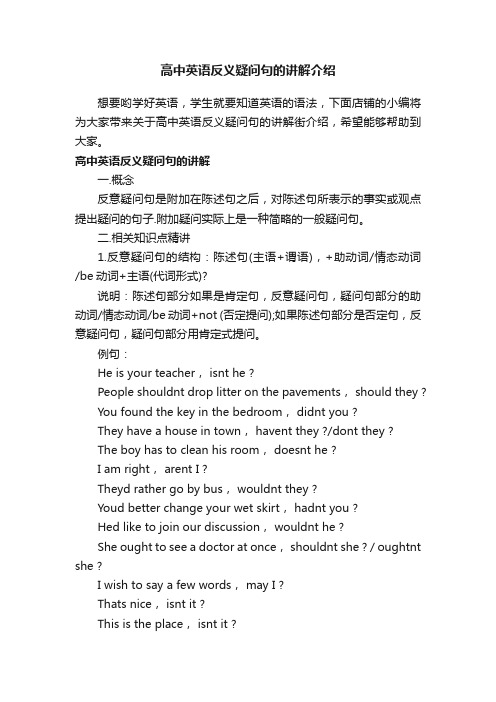
高中英语反义疑问句的讲解介绍想要哟学好英语,学生就要知道英语的语法,下面店铺的小编将为大家带来关于高中英语反义疑问句的讲解街介绍,希望能够帮助到大家。
高中英语反义疑问句的讲解一.概念反意疑问句是附加在陈述句之后,对陈述句所表示的事实或观点提出疑问的句子.附加疑问实际上是一种简略的一般疑问句。
二.相关知识点精讲1.反意疑问句的结构:陈述句(主语+谓语),+助动词/情态动词/be动词+主语(代词形式)?说明:陈述句部分如果是肯定句,反意疑问句,疑问句部分的助动词/情态动词/be动词+not (否定提问);如果陈述句部分是否定句,反意疑问句,疑问句部分用肯定式提问。
例句:He is your teacher, isnt he ?People shouldnt drop litter on the pavements, should they ?You found the key in the bedroom, didnt you ?They have a house in town, havent they ?/dont they ?The boy has to clean his room, doesnt he ?I am right, arent I ?Theyd rather go by bus, wouldnt they ?Youd better change your wet skirt, hadnt you ?Hed like to join our discussion, wouldnt he ?She ought to see a doctor at once, shouldnt she ? / oughtnt she ?I wish to say a few words, may I ?Thats nice, isnt it ?This is the place, isnt it ?Everybody knows the answer, dont they ?Nothing is serious, isnt it?There wasnt enough time at that moment, was there ?There used to a tower here, usednt there? / didnt there ?What you need is more practice, isnt it ?2.某些特殊句型的反意疑问句:1)祈使句的反意疑问句:表示肯定意义的祈使句,即表示请求,提示它的反意疑问句用will you 表达:有时也可以用wont you 表示。
从句与反义疑问句
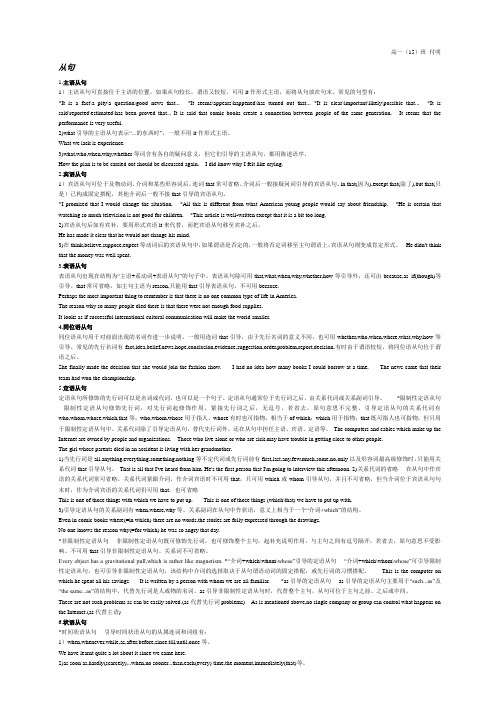
高一(15)班付明从句1.主语从句1)主语从句可直接位于主语的位置,如果从句较长,谓语又较短,可用it作形式主语,而将从句放在句末。
常见的句型有:*It is a fact\a pity\a question\good news that... *It seems\appears\happened\has turned out that... *It is clear\important\likely\possible that... *It is said\reported\estimated\has been proved that... It is said that comic books create a connection between people of the same generation. It seems that the performance is very useful.2)what引导的主语从句表示“...的东西时”,一般不用it作形式主语。
What we lack is experience.3)what,who,when,why,whether等词含有各自的疑问意义,但它们引导的主语从句,都用陈述语序。
How the plan is to be carried out should be discussed again. I did know why I felt like crying.2.宾语从句1)宾语从句可位于及物动词、介词和某些形容词后。
连词that常可省略。
介词后一般接疑问词引导的宾语从句。
in that(因为),except that(除了),but that(只是)已构成固定搭配,其他介词后一般不接that引导的宾语从句。
*I promised that I would change the situation. *All this is different from what American young people would say about friendship. *He is certain that watching so much television is not good for children. *This article is well-written except that it is a bit too long.2)宾语从句后如有宾补,要用形式宾语it来代替,而把宾语从句移至宾补之后。
英语反义疑问句最全解析

反义疑问句1)“am I”的否定形式是“aren’t I”,而不是“am not I”或“amn’t I”。
例如:I am right, aren’t I?2)everything和nothing作为陈述句的主语时是单数,因此反意疑问句中的主语要用“it”。
注意,nothing作为主语时,反意疑问句中的动词要用肯定形式。
例如:Nothing is wrong, is it?3)陈述句中的主语为everyone, everybody, anyone, nobody或no one时,反意疑问句中的主语用they。
注意,nobody和no one是否定词,因此反意疑问句应该用肯定的。
例如:Nobody knows it, do they?4)如果陈述句部分有no, never, hardly, scarcely, rarely, seldom等词,那么,陈述句本身就是否定的,所以要接一个肯定的反意疑问句。
例如:He has never been there, has he?5)如果陈述句中的动词是“wish”,那么反意疑问句中要用“may”。
例如:I wish to go there with you, may I?6)包括听话人在内时“let’s”的反意疑问句要用“shall we”。
反之,反意疑问句中要用“will you”。
例如:Let’s go, shall we?Let us go, will you?全真模拟试题1. All of the plants now farmed on a large scale were developed from plants ____ wild.A. that once growB. once they growC. they once grewD. once grew2. By the time you graduate, we ____ in Australia for one year.A. will be stayingB. will have stayedC. would have stayedD. have stayed3. He appreciated ____ the chance to deliver his thesis in the annual symposium on Comparative Literature.A. having givenB. to have been givenC. to have givenD. having been given4. The government official can hardly find sufficient grounds ____his arguments in favor of the revision of the tax law.A. on which to baseB. which to be based onC. to base on whichD. on which to be based5. Living in the desert involves a lot of problems, ____water shortage is the worst.A. not to mentionB. of whichC. let aloneD. for what6. Hydrogen is one of the most important element in the universe ____ it provides the building blocks from which the other elementsare produced.A.so thatB. but thatC. provided thatD. in that7. Just as relaxation is an important part of our lives, ____stress.A.so isB. as it isC. and so isD. the same is8. Victor took a bus and headed for home, ____ if his wife would have him back.A. not to knowB. not knownC. not knowingD. not having known9. We can make an exception ____.A. in any case of JohnB. in case of JohnC. in case of John’sD. in the case of John10. When the Cultural Revolution was launched in China, his father ______ college.A. attendedB. had been attendingC. was attendingD. has been attending11. My cat is a fussy eater, but my dog is so ____ that she’ll swallow down anything that is put in front of her.A. indiscriminateB. choosyC. indefiniteD. picky12. “This house is more ____than the federal government!” Mac complained to his parents. “You have rules for everything.”A. systematicB. democraticC. bureaucraticD. public试题答案与解析1. A)【句意】大规模种植的农作物都繁衍于野生植物。
三大从句及反义疑问句及其答案
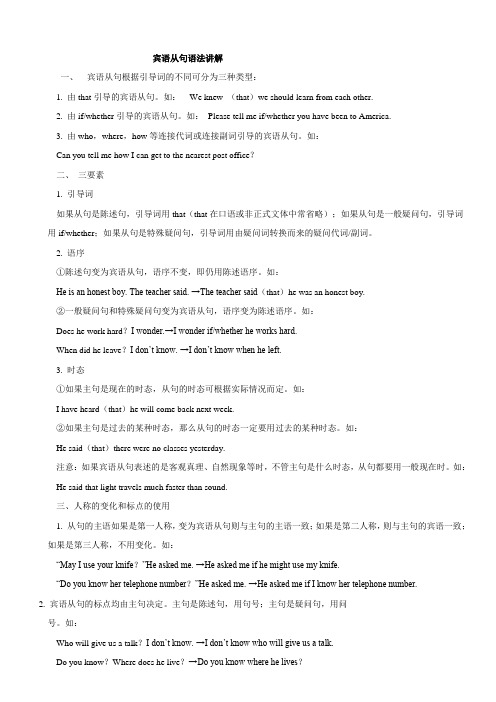
宾语从句语法讲解一、宾语从句根据引导词的不同可分为三种类型:1. 由that引导的宾语从句。
如:We knew (that)we should learn from each other.2. 由if/whether引导的宾语从句。
如:Please tell me if/whether you have been to America.3. 由who,where,how等连接代词或连接副词引导的宾语从句。
如:Can you tell me how I can get to the nearest post office?二、三要素1. 引导词如果从句是陈述句,引导词用that(that在口语或非正式文体中常省略);如果从句是一般疑问句,引导词用if/whether;如果从句是特殊疑问句,引导词用由疑问词转换而来的疑问代词/副词。
2. 语序①陈述句变为宾语从句,语序不变,即仍用陈述语序。
如:He is an honest boy. The teacher said. →The teacher said(that)he was an honest boy.②一般疑问句和特殊疑问句变为宾语从句,语序变为陈述语序。
如:Does he work hard?I wonder.→I wonder if/whether he works hard.When did he leave?I don’t know. →I don’t know when he left.3. 时态①如果主句是现在的时态,从句的时态可根据实际情况而定。
如:I have heard(that)he will come back next week.②如果主句是过去的某种时态,那么从句的时态一定要用过去的某种时态。
如:He said(that)there were no classes yesterday.注意:如果宾语从句表述的是客观真理、自然现象等时,不管主句是什么时态,从句都要用一般现在时。
条件状语从句反义疑问句
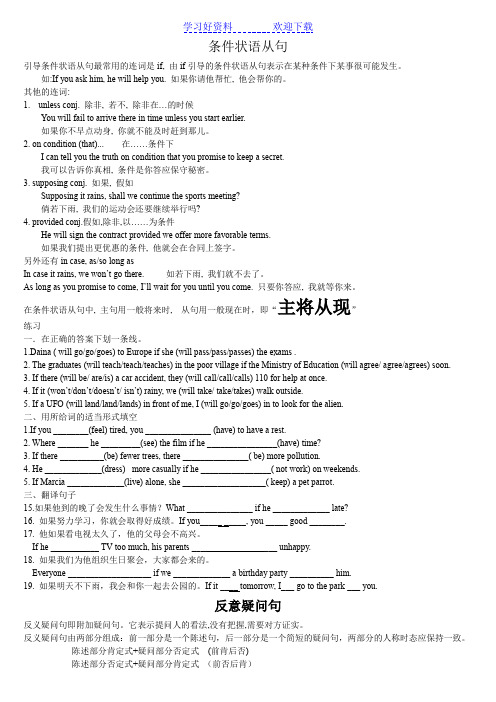
条件状语从句引导条件状语从句最常用的连词是if, 由if引导的条件状语从句表示在某种条件下某事很可能发生。
如:If you ask him, he will help you. 如果你请他帮忙, 他会帮你的。
其他的连词:1.unless conj. 除非, 若不, 除非在…的时候You will fail to arrive there in time unless you start earlier.如果你不早点动身, 你就不能及时赶到那儿。
2. on condition (that)... 在……条件下I can tell you the truth on condition that you promise to keep a secret.我可以告诉你真相, 条件是你答应保守秘密。
3. supposing conj. 如果, 假如Supposing it rains, shall we continue the sports meeting?倘若下雨, 我们的运动会还要继续举行吗?4. provided conj.假如,除非,以……为条件He will sign the contract provided we offer more favorable terms.如果我们提出更优惠的条件, 他就会在合同上签字。
另外还有in case, as/so long asIn case it rains, we won’t go there. 如若下雨, 我们就不去了。
As long as you promise to come, I’ll wait for you until you come. 只要你答应, 我就等你来。
在条件状语从句中, 主句用一般将来时, 从句用一般现在时,即“主将从现”练习一.在正确的答案下划一条线。
1.Daina ( will go/go/goes) to Europe if she (will pass/pass/passes) the exams .2. The graduates (will teach/teach/teaches) in the poor village if the Ministry of Education (will agree/ agree/agrees) soon.3. If there (will be/ are/is) a car accident, they (will call/call/calls) 110 for help at once.4. If it (won’t/don’t/doesn’t/ isn’t) rainy, we (will take/ take/takes) walk outside.5. If a UFO (will land/land/lands) in front of me, I (will go/go/goes) in to look for the alien.二、用所给词的适当形式填空1.If you ________(feel) tired, you _______________ (have) to have a rest.2. Where _______ he _________(see) the film if he ________________(have) time?3. If there __________(be) fewer trees, there _______________( be) more pollution.4. He _____________(dress) more casually if he ________________( not work) on weekends.5. If Marcia _____________(live) alone, she ___________________( keep) a pet parrot.三、翻译句子15.如果他到的晚了会发生什么事情?What _______________ if he _____________ late?16. 如果努力学习,你就会取得好成绩。
- 1、下载文档前请自行甄别文档内容的完整性,平台不提供额外的编辑、内容补充、找答案等附加服务。
- 2、"仅部分预览"的文档,不可在线预览部分如存在完整性等问题,可反馈申请退款(可完整预览的文档不适用该条件!)。
- 3、如文档侵犯您的权益,请联系客服反馈,我们会尽快为您处理(人工客服工作时间:9:00-18:30)。
条件状语从句引导条件状语从句最常用的连词是if, 由if引导的条件状语从句表示在某种条件下某事很可能发生。
如:If you ask him, he will help you. 如果你请他帮忙, 他会帮你的。
其他的连词:1.unless conj. 除非, 若不, 除非在…的时候You will fail to arrive there in time unless you start earlier.如果你不早点动身, 你就不能及时赶到那儿。
2. on condition (that)... 在……条件下I can tell you the truth on condition that you promise to keep a secret.我可以告诉你真相, 条件是你答应保守秘密。
3. supposing conj. 如果, 假如Supposing it rains, shall we continue the sports meeting?倘若下雨, 我们的运动会还要继续举行吗?4. provided conj.假如,除非,以……为条件He will sign the contract provided we offer more favorable terms.如果我们提出更优惠的条件, 他就会在合同上签字。
另外还有in case, as/so long asIn case it rains, we won’t go there. 如若下雨, 我们就不去了。
As long as you promise to come, I’ll wait for you until you come. 只要你答应, 我就等你来。
在条件状语从句中, 主句用一般将来时, 从句用一般现在时,即“主将从现”练习一.在正确的答案下划一条线。
1.Daina ( will go/go/goes) to Europe if she (will pass/pass/passes) the exams .2. The graduates (will teach/teach/teaches) in the poor village if the Ministry of Education (will agree/ agree/agrees) soon.3. If there (will be/ are/is) a car accident, they (will call/call/calls) 110 for help at once.4. If it (won’t/don’t/doesn’t/ isn’t) rainy, we (will take/ take/takes) walk outside.5. If a UFO (will land/land/lands) in front of me, I (will go/go/goes) in to look for the alien.二、用所给词的适当形式填空1.If you ________(feel) tired, you _______________ (have) to have a rest.2. Where _______ he _________(see) the film if he ________________(have) time?3. If there __________(be) fewer trees, there _______________( be) more pollution.4. He _____________(dress) more casually if he ________________( not work) on weekends.5. If Marcia _____________(live) alone, she ___________________( keep) a pet parrot.三、翻译句子15.如果他到的晚了会发生什么事情?What _______________ if he _____________ late?16. 如果努力学习,你就会取得好成绩。
If you_____ _____, you _____ good ________.17. 他如果看电视太久了,他的父母会不高兴。
If he _ ___ TV too much, his parents __ _ ___ unhappy.18. 如果我们为他组织生日聚会,大家都会来的。
Everyone ___________________ if we _____________ a birthday party __________ him.19. 如果明天不下雨,我会和你一起去公园的。
If it ____ tomorrow, I___ go to the park ___ you.反意疑问句反义疑问句即附加疑问句。
它表示提问人的看法,没有把握,需要对方证实。
反义疑问句由两部分组成:前一部分是一个陈述句,后一部分是一个简短的疑问句,两部分的人称时态应保持一致。
陈述部分肯定式+疑问部分否定式(前肯后否)陈述部分否定式+疑问部分肯定式(前否后肯)请注意以下句型的反义疑问句的用法:1、当陈述部分的主语是everybody, everyone, someone, nobody, no one, somebody等合成代词时,附加疑问句中的主语通常用they。
但亦可用he,尤其是nobody, no one等作主语,具有否定概念时。
如:Somebody phoned while I was out, didn’t they?2、当陈述部分的主语是不定代词everything, nothing, anything, something时,附加疑问句中的主语一般用it,不用they。
如:Everything seems all right now, doesn’t it?3、当陈述部分的主语是指示代词this, that或these, those时,附加疑问句中的主语分别用it和they。
如:This is important, isn’t it? / These are your friends Tom and Jack, aren’t they?4、当陈述句为there be结构时,附加疑问句用be there。
如:There’s no help for it, is there? / There’s something wrong, isn’t there?5、陈述部分带有seldom, hardly, never, rarely, few, little, nowhere, nothing等否定词或半否定词时,附加疑问部分的动词用肯定形式。
如:Bob rarely got drunk, did he? / Few people know him, do they?6、在由“祈使句+附加疑问”构成的附加疑问句中,附加疑问部分一般用will you, won’t you。
如:Don’t open the door, will you? / Give me some cigarettes, won’t you?但是,以let’s开头的祈使句,附加疑问部分用shall we;以let us开头的祈使句,疑问部分用will you。
如:Let’s have a basketball match this afternoon, shall we?Let us go out for a rest, will you?7、当陈述部分含有情态动词used to时,疑问部分可用usedn’t或didn’t。
如:The old man used to smoke, didn’t he?或usedn’t he?8、当陈述部分的主语是I,谓语是think, believe, suppose, expect这类动词时,附加疑问部分则往往与从句中的主语和谓语动词保持对应关系。
I suppose that he’s serious,isn’t he? I don’t think she cares, does she?巩固练习:1. I don’t think that the necklace is made of diamond, ________?A. do IB. do youC. isn’t itD. is it2. His wife had the carpets and the curtains cleaned, ________?A. hadn’tB. hadC. didn’t sheD. did she3. No one left here yesterday,________?A. didn’t theyB. did theyC. didn’t oneD. did one4. Birds rarely build nests in our garden,________?A. don’t theyB. do theyC. didn’t theyD. did they5. You must have been to the Great Wall,____________?A. mustn’t youB. haven’t youC. aren’t youD. must you6. learning how to repair motors takes a long time,________?A. doesn’t itB. don’t theyC. does itD. do they7.They must have stayed at home last night,________?A. mustn’t theyB. haven’t theyC. didn’t theyD. must they8.Let’s start out early tomorrow morning,________?A. shall weB. will youC. do youD. can’t you9.There’s not much news in today’s newspaper,________?A. isn’t itB. is itC. isn’t thereD. is there10.She’s been a worker here for many years,________?A. isn’t sheB. is sheC. hasn’t sheD. has she11.What beautiful flowers,________?A. aren’t theyB. are theyC. isn’t itD. is it12.Mother used to live in a poor village,____________?A. used sheB. usedn’t sheC. didn’t heD. did he。
